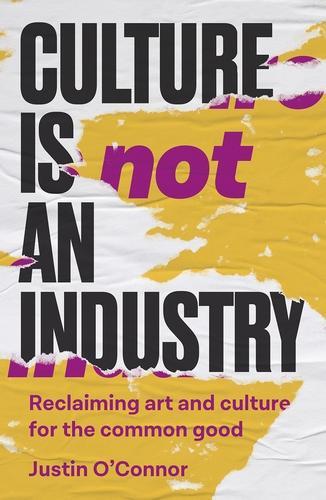
Culture is Not an Industry: Reclaiming Art and Culture for the Common Good
(Hardback)
Available Formats
Publishing Details
Culture is Not an Industry: Reclaiming Art and Culture for the Common Good
By (Author) Justin O'Connor
Manchester University Press
Manchester University Press
5th June 2024
United Kingdom
Classifications
Tertiary Education
Non Fiction
Political economy
Social and political philosophy
306.0941
Physical Properties
Hardback
304
Width 129mm, Height 198mm, Spine 22mm
403g
Description
Culture is at the heart to what it means to be human. But twenty-five years ago, the British government rebranded art and culture as creative industries, valued for their economic contribution, and set out to launch the UK as the creative workshop of a globalised world.
Where does that leave art and culture now Facing exhausted workers and a lack of funding and vision, culture finds itself in the grip of accountancy firms, creativity gurus and Ted Talkers. At a time of sweeping geo-political turmoil, culture has been de-politicised, its radical energies reduced to factors of industrial production. This book is about what happens when an essential part of our democratic citizenship, fundamental to our human rights, is reduced to an industry.
Culture is not and industry argues that art and culture need to renew their social contract and re-align with the radical agenda for a more equitable future. Bold and uncompromising, the book offers a powerful vision for change.
Reviews
'Imaginative culture art, stories, decoration, styles is how we anticipate the future and feel our way into it: our antennae. Treating culture as an industry subject to the crude rules of neoliberalism doesnt make any more sense than treating healthcare the same way. Justin OConnors brilliant book argues for a holistic, ecological vision of culture in which it is seen as an essential part of the maintenance of a functioning society.'
Brian Eno
Culture is not an industry radically remakes the case for culture and cultural policy in the twenty-first century. Rejecting the trend for cultures depoliticisation and the illusions of the "creative industries", OConnor proposes a dynamic new approach where culture is recentred as foundational to citizenship, democracy and a new kind of economy.'
Mark Banks, Professor of Cultural Economy, University of Glasgow
A passionate and well-argued corrective that seeks to rebalance the cultural scales away from the economic to a larger sense of social purpose. The books central argument is that we must reclaim art, give it place and recognition in all and every society that wishes to live well and without fear. Ill buy that
Josephine Burns, Co-Founder of BOP Consulting
In an era of culture wars and governmental disdain for mickey mouse degrees and anything that can't have a price tag placed on it, and in the aftermath of the millennial era when post-industrial towns were supposedly transformed by giant sculptures, Justin O'Connor makes a brave and important argument that culture high and low is important for its own sake.
Owen Hatherley, author of Clean Living Under Difficult Circumstances
'The way we talk about culture in society has become narrow and stale, concerned only with economics or questions of representation. This book offers us a broader critique that does not neglect these questions but deepens them. With scholarship, wit and a clarity of thought, it promises to reset the cultural conversation in the years ahead.'
Kate Oakley, Professor of Cultural Policy, University of Glasgow
Justin O'Connor restores culture to its rightful place as the embodiment of meaning. He shows how it is a public good that needs to be treasured and nurtured, not just, or even mainly, an industry. He throws down the gauntlet to the prevailing dogma and points to ways that culture can be better valued. Not as a tool of industry or politics but the essence of our humanity and a pillar of any successful society.
Julianne Schultz, Professor Emerita, Media and Culture, Griffith University
Author Bio
Justin OConnor is Professor of Cultural Economy at the University of South Australia. His books include Red Creative: Culture and Modernity in China (2020) with Xin Gu and Reset: Art, Culture and the Foundational Economy (2022).
